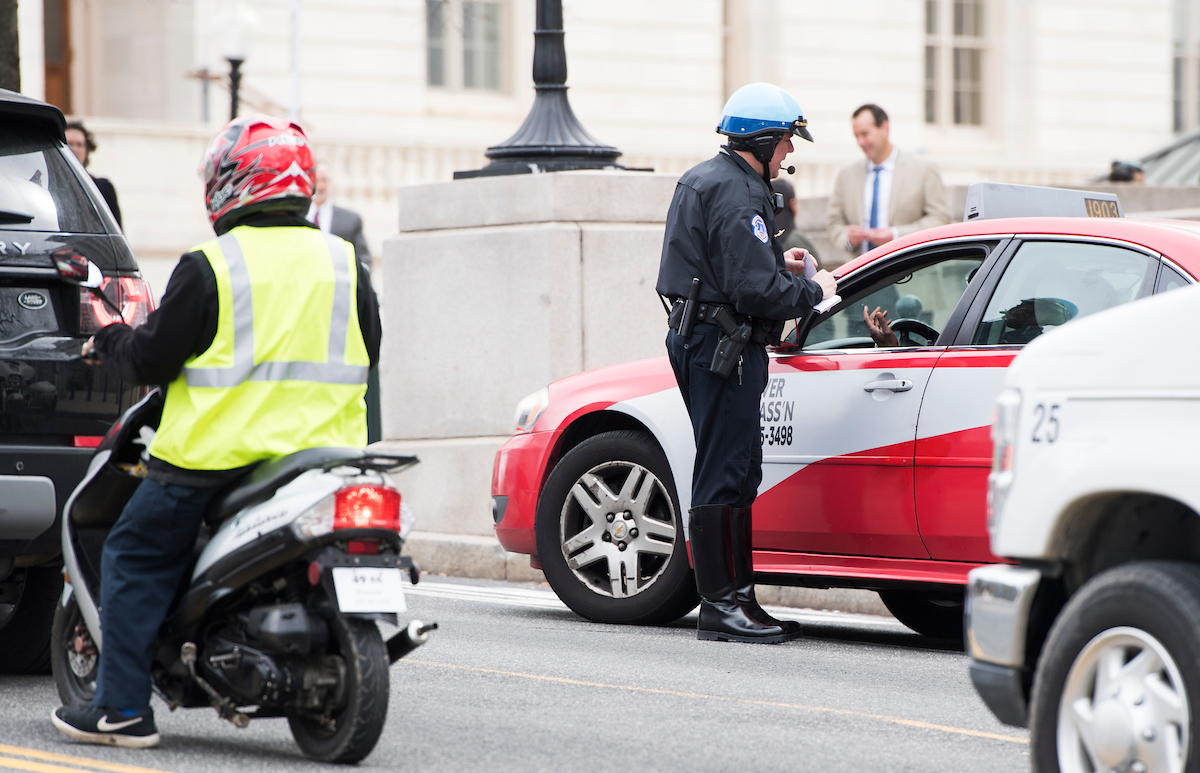Protesters and traffic violations dominate Capitol Police arrests

Protests, demonstrations and traffic violations dominate recent arrests made by Capitol Police, according to a report on publicly available arrest summaries by advocacy group Demand Progress and an independent analysis of arrest data by Roll Call.
In December, the Capitol Police began publishing its weekly arrest summaries online each Wednesday, data that was previously distributed via email to the media. The summaries include the Capitol File Number, or CFN; crime classification with any additional charges; offense date and time; and crime summary.
Demand Progress’ analysis focused on 86 incidents involving 160 individuals between Dec. 19, 2018, and Feb. 28, 2019. Roll Call’s study of 132 incidents between Nov 15, 2018, and Feb 28, 2019, found similar results.
Approximately 55 percent of events were traffic-related (73 instances), according to Roll Call’s analysis. Some of those arrests resulted in additional charges, including driving under the influence, possession of drug paraphernalia or failure to exhibit a license.
Some of the traffic-related arrests were made far afield of the Capitol grounds, including the 600 block of M Street Southeast in the Navy Yard neighborhood and 50 First Street NE in NoMa.
The jurisdiction of the Capitol Police was expanded in the early 1990s amid a crime wave that made Washington the “murder capital” with 482 homicides in 1991.
In 1992, Tom Barnes, a legislative assistant to Alabama Sen. Richard C. Shelby, was shot and killed while walking to a store close to his home near the Capitol. That year, aspiring congressional aide Abbey McCloskey was sexually assaulted and murdered in a Capitol Hill alley. In the spring of 1992, Michigan Rep. Bob Traxler was clubbed unconscious and robbed of $8 as he was walking to his car.
Signed into law in October 1992, the United States Capitol Police Jurisdiction Act granted authority to any on-duty Capitol Police officer to make arrests and enforce federal and District of Columbia laws beyond the bounds of the Capitol grounds or in the presence of lawmakers.
Although the Capitol Police are focused on protecting the Capitol complex, their officers patrol neighborhoods surrounding the Capitol in an area bound by H Street to the north, Potomac Avenue to the south, Third Street to the west and Seventh Street to the east.
The 1992 law specifies that while the Capitol Police is authorized to operate within those borders, officers can also take action “within the District of Columbia” more broadly in certain instances “to prevent imminent loss of life or injury to person or property, if the officer is in the performance of official duties when the authority is exercised.”
Of the handful of arrests made outside the specific jurisdictional area between December and February, most were traffic-related, and the suspects were revealed to not possess a valid permit in Maryland, Virginia or the District of Columbia. One was a vehicle that D.C.’s Metropolitan Police Department was looking for, and the suspect had two active warrants for his arrest.
While traffic-related violations made up more than half the total arresting incidents, they usually involved just a single suspect.
Meanwhile, the violations that drove the most arrests, according to Capitol Police records, were protests and demonstrations. The most common arrests were of protesters and demonstrators in House or Senate office buildings. Capitol Police charges protesters with D.C. Code 22-1307, Crowding, Obstructing, or Incommoding, which means they blocked a hallway, office or other space.
In just 12 separate instances, Capitol Police arrested 235 individuals and charged them with Crowding, Obstructing, or Incommoding. Additional demonstrators were charged with disorderly conduct for disrupting hearings or other protest actions.
According to the Demand Progress report, four individuals were arrested after the Capitol Police approached them for suspected marijuana use. While smoking marijuana in public is illegal, as is possession under federal law, the District of Columbia does not prohibit possession of marijuana in quantities of two ounces or less.
The weekly arrest summaries released by the department are not comprehensive, Demand Progress reported. “Not all USCP arrests result in publicly-available reports,” the study reads, quoting the Capitol Police. According to the department, reports accompanying arrests can be withheld “due to security concerns that may impact the safety of public officials under the Department’s protection, as well as to safeguard the means and methods by which we secure the Capitol Complex.”
As part of the Legislative Branch, the Capitol Police are exempt from Freedom of Information Act requests. The department has said it is exempt from having to release to another entity any information “that relates to actions taken … in response to an emergency situation, or to any other counterterrorism and security preparedness measures” unless it determines that releasing the information will not “jeopardize the security and safety” of the Capitol complex.
Capitol Police Chief Matthew R. Verderosa testifies Tuesday morning before the House Legislative Branch Appropriations Subcommittee to present and defend the department’s $463.3 million budget request for fiscal 2020. The proposal represents a 1.5 percent increase over enacted spending levels.





